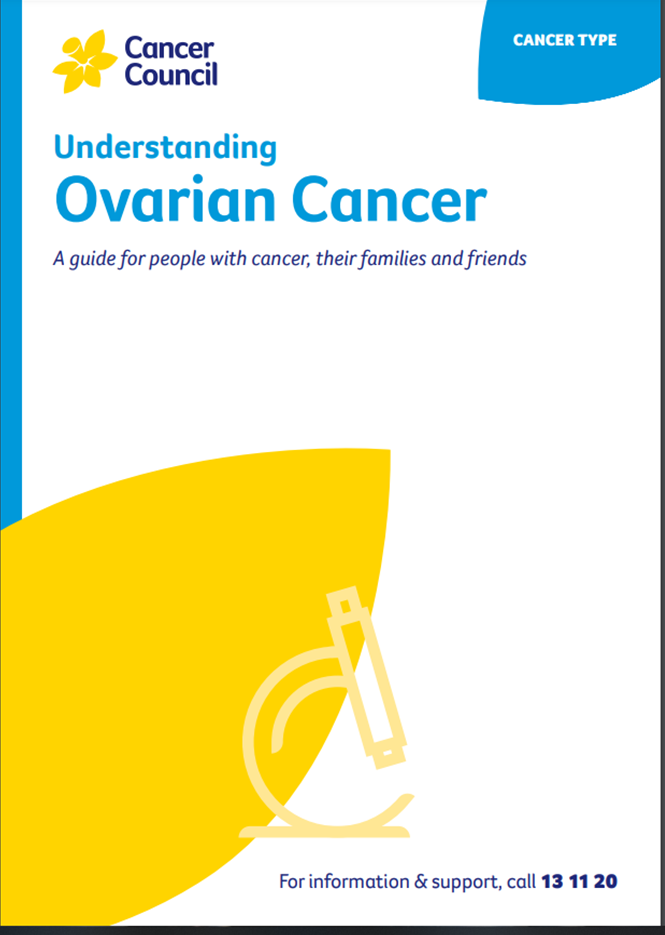- Home
- Ovarian cancer
- Diagnosis
- Staging and prognosis
Staging and prognosis for ovarian cancer
These tests help show whether you have ovarian cancer and whether it has spread to other parts of the body. This process is called staging and it helps your health care team recommend the best treatment for you.
Learn more about:
Staging ovarian cancer
Once ovarian cancer is diagnosed, it will be staged. This process helps your health care team recommend the best treatment for you.
The staging system most commonly used for ovarian cancer is the International Federation of Gynecology and Obstetrics (FIGO) system. Stages 1–2 are early ovarian cancer, while 3–4 are advanced. About 7 out of 10 cases of epithelial ovarian cancer are diagnosed at stage 3 or 4.
The stages of ovarian cancer
The 4 stages of ovarian cancer in the FIGO system may be divided into sub-stages, such as A, B, C, which indicate increasing amounts of tumour.
| stage 1 | Cancer is in one or both ovaries or fallopian tubes only. |
| stage 2 | Cancer is in one or both ovaries or fallopian tubes and has spread to other organs in the pelvis (uterus, bladder or bowel). |
| stage 3 | Cancer is in one or both ovaries or fallopian tubes and has spread outside the pelvis to the lining of the abdomen (peritoneum) or to nearby lymph nodes. |
| stage 4 | The cancer has spread outside the abdomen to distant organs such as the lungs or liver. |
Grading ovarian cancer
Some types of ovarian cancer will be given a grade. This is a score that describes how the cancer cells look compared with normal cells under a microscope. The grade suggests how quickly the cancer may grow.
Epithelial ovarian cancer is simply divided into low grade and high grade and a number is not given. The most common type of epithelial ovarian cancer is high-grade serous cancer. Sometimes, numbers between 1 and 3 are assigned to other types of ovarian cancers.
Prognosis
Prognosis means the expected outcome of a disease. You may wish to discuss your prognosis and treatment options with your doctor, but it is not possible for anyone to predict the exact course of the disease.
For your prognosis, your doctor will consider:
- test results
- the ovarian cancer type
- its stage and grade
- genetic factors
- likelihood of response to treatment
- factors such as your age, fitness and overall health.
| Epithelial cancer | If epithelial ovarian cancer is diagnosed and treated when the cancer is only in the ovary (stage 1), it has a good prognosis. Many cases of more advanced cancer may respond well to the initial treatment, but the cancer can often come back (recur) and further treatment is needed. |
| Stromal cell and germ cell tumours | These can usually be treated successfully, although there may be a small risk that the cancer will come back and need further treatment. |
| Borderline tumour | This can often be treated successfully with surgery alone. |
Discussing your prognosis can be challenging and stressful. It may help to talk with family and friends. You can also call Cancer Council 13 11 20.
→ READ MORE: Your health care team
Podcast: Coping with a Cancer Diagnosis
Listen to more of our podcast for people affected by cancer
More resources
Dr Antonia Jones, Gynaecological Oncologist, The Royal Women’s Hospital and Mercy Hospital for Women, VIC; Dr George Au-Yeung, Medical Oncologist, Peter MacCallum Centre, VIC; Dr David Chang, Radiation Oncologist, Peter MacCallum Cancer Centre, VIC; Prof Anna DeFazio AM, Sydney West Chair of Translational Cancer Research, The University of Sydney, Director, Centre for Cancer Research, The Westmead Institute for Medical Research and Director, Sydney Cancer Partners, NSW; Ian Dennis. Consumer (Carer); A/Prof Simon Hyde, Head of Gynaecological Oncology, Mercy Hospital for Women, VIC; Carmel McCarthy, Consumer; Quintina Reyes, Clinical Nurse Consultant – Gynaecological Oncology, Westmead Hospital, NSW; Deb Roffe, 13 11 20 Consultant, Cancer Council SA.
View the Cancer Council NSW editorial policy.
View all publications or call 13 11 20 for free printed copies.

